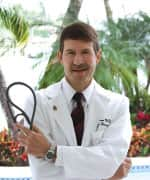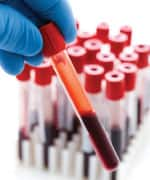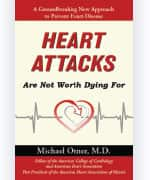Life Extension Magazine®

Michael Ozner is a board-certified cardiologist and Medical Director of Wellness and Prevention at Baptist Health South Florida. He has dedicated his career to the eradication of atherosclerotic cardiovascular disease, namely heart attacks and strokes.
In his new book, Heart Attacks Are Not Worth Dying For, Dr. Ozner shares his revolutionary approach to ending heart disease, an epidemic that kills nearly 18 million people every year worldwide.
Dr. Ozner discusses a paradigm shift about how we can stabilize, regress and, in some cases, eradicate the buildup of fatty deposits in the artery walls, called atherosclerotic plaques. This can significantly lower the risk of heart attacks and other vascular catastrophes.
His latest book provides a straightforward pathway written for patients and their doctors to end the devastation of heart disease and live a longer life.
As a primary course of action, Dr. Ozner advocates making lifestyle changes that include the Mediterranean diet, exercise, stress reduction, smoking cessation, and quality sleep.
But many people are not able to achieve optimal heart health just through these measures.
For those individuals, Dr. Ozner explains how utilizing lifestyle interventions, advanced blood testing, vascular imaging, and highly effective medications (when needed) can safely reduce and potentially eliminate risk of vascular disease and coronary heart disease.
In this exclusive interview, Dr. Ozner talks about the root cause of heart disease—and the steps you can take to eliminate cardiovascular disease risk factors and achieve heart health and longevity.
—Laurie Mathena
LE: What does the latest research reveal about heart disease?
Dr. Ozner: As a preventive cardiologist, I have been in the trenches, fighting this disease for decades. We have recently made tremendous progress in our ability to identify and remove the root cause of this disease and the risk factors that fan the flames in the fire of this epidemic.
The amazing thing is that heart disease isn’t the inevitable consequence of aging. We know what to do to prevent it. And we now know what to do to reverse it!
LE: How can coronary heart disease be prevented?

Dr. Ozner: We can prevent coronary heart disease by attacking and eliminating the primary cause—an excess number of cholesterol—and triglyceride-carrying particles called lipoproteins.
When there are too many potentially harmful (apoB) lipoprotein particles in the bloodstream, they can enter the blood vessel wall and lead to an atherosclerotic plaque. A heart attack is the result of a plaque rupture.
LE: How is our modern Western diet contributing to the heart disease epidemic?
Dr. Ozner: Unfortunately, many of the foods that make up our traditional Western diet are toxic to our bodies. Consuming unhealthy food is like putting diesel fuel in a gasoline-powered car—it simply does not work. We are not genetically programmed to function on processed food!
In fact, processed food is directly related to the ever-increasing spikes in obesity, hypertension, diabetes, heart disease, stroke, and yes, death. The toxic American diet is loaded with preservatives, sodium, refined sugar, and bad fats.
LE: What’s the alternative?
Dr. Ozner: Research studies have shown that those following a traditional Mediterranean diet and lifestyle suffer significantly less heart disease and are far less likely to die from a heart attack.
Researchers from Italy recently looked at all studies through June 2010 that assessed the benefits of the Mediterranean diet, and published them in the American Journal of Clinical Nutrition. 1 They found that the Mediterranean diet was associated with a statistically significant reduction of overall mortality, as well as cardiovascular mortality, cancer mortality, and neurodegenerative diseases.
But even more compelling is research showing that those who switch to a Mediterranean diet and lifestyle share in the same health benefits (including fewer heart attacks, a longer life expectancy, and a reduced risk of cancer), regardless of where they live or what their diets were like before.
LE: What about exercise?
Dr. Ozner: Dozens of clinical studies support the beneficial impact that exercise has on health. Regarding hypertension, the scientific literature shows that, on average, exercise decreases blood pressure in about 75% of all people with hypertension.2
Clinical studies have demonstrated that those who engage in regular physical activity significantly reduce their risk of a heart attack.3
Exercise also has been shown to lower total cholesterol, raise “good” HDL cholesterol, lower triglycerides, and make the “bad” LDL cholesterol particles larger.
Larger LDL particles are less likely than smaller particles to get trapped in the arterial wall, become oxidized, and form a plaque that can eventually rupture and lead to a heart attack.
LE: What if lifestyle changes alone aren’t enough to lower cholesterol and triglyceride levels?

Dr. Ozner: It is often said that people would be able to prevent this devastating disease if they would only follow a healthy lifestyle. Sadly, the reality is that most people are not compliant with healthy lifestyle choices, and sometimes lifestyle changes are not enough to stop the devastation of heart disease.
The good news is that there has been a “revolution” in heart disease prevention over the past decade. This has resulted in major breakthroughs in our battle against heart attack risk factors.
Over the past decade, we have made tremendous strides in developing highly effective medications that can stabilize, reduce, and in some cases eliminate blockages in our arteries. These therapeutic advances have led to a marked reduction in heart attacks and strokes.
New medications have been developed that significantly enhance the lowering of LDL cholesterol, triglycerides, lipoprotein (a), and vascular inflammation.
LE: Does this include statin drugs?
Dr. Ozner: Yes. Statins have become the first-line medication to lower cholesterol. Most importantly, numerous statin trials have demonstrated a significant reduction in heart attack risk in patients with elevated LDL cholesterol.
Popular brands include Crestor® (rosuvastatin), Lipitor® (atorvastatin) and Zocor® (simvastatin). Since they are available as generics, they are very cost effective.
LE: Statin medications have been available for decades, but they have not solved the heart attack pandemic. Why is this?
Dr. Ozner: The reason for this is that statins are limited in how much they can lower LDL cholesterol. Studies have shown that statins lower heart attack risk by about 35%—well, what about the 65% who have heart attacks despite taking statin medications?
This problem has been solved with the advent of new medications. These new medications allow us to achieve low LDL cholesterol levels that heretofore we have been unable to achieve with lifestyle intervention and statins. We now have the necessary “arrows in the quiver” to significantly lower the risk of heart attacks, strokes and vascular disease. We are now in a position to defeat this formidable enemy called cardiovascular disease.
Cholesterol-absorption inhibitors (ezetimibe or Zetia) can lower LDL cholesterol an additional 15% to 25% when added to statins.4 Clinical trials have shown that these medications are safe and lower heart attack risk compared to statin therapy alone.
The most promising new medications are known as PCSK9 inhibitors. When added to statins, there can be a further 50% to 60% reduction in LDL cholesterol,5 resulting in LDL levels that we have not been able to achieve before—levels as low as 20 mg/dL and less! When it comes to LDL cholesterol, it has been shown that “lower is better”–the lower the LDL cholesterol, the lower is the risk of heart attack. It has also been shown in clinical studies that “earlier is better”–the earlier in life we can achieve normal LDL cholesterol, the lower the subsequent risk of cardiac events.
LE: Is it safe to reduce LDL this low?
Dr. Ozner: Clinical trials have demonstrated that there are no significant adverse effects of lowering LDL cholesterol with statins, cholesterol-absorption inhibitors, PCSK9 inhibitors or PCSK9 interfering agents. Studies have also shown that individuals genetically predisposed to low LDL cholesterol levels over a lifetime had no adverse effects and had a very low incidence of cardiovascular disease.
LE: Can you tell us more about PCSK9 inhibitors?
Dr. Ozner: PCSK9 inhibitors are one of the more recent and exciting medications that have been developed to lower LDL cholesterol.
PCSK9 is a protein that decreases the amount of LDL cholesterol that can be removed from the bloodstream by the liver. By inhibiting PCSK9, we can now significantly lower LDL cholesterol.
Clinical trials have demonstrated a significant lowering of LDL cholesterol levels by 50% or greater on top of statins.5
Most importantly, PCSK9 clinical-outcome trials (Fourier and Odyssey Outcomes) have shown that PCSK9 inhibitors are safe and lead to a significant reduction in cardiovascular events.
Repatha® (evolocumab) and Praluent® (alirocumab) are PCSK9 inhibitors approved for use in the United States, and they are given by subcutaneous injection every two to four weeks.
The most exciting new medication is inclisiran, an interfering agent that reduces the production of PCSK9. Inclisiran has been shown to be safe and only needs to be given by subcutaneous injection once every six months. It is expected to gain FDA approval soon.
LE: How long should someone take medications like these?

Dr. Ozner: Researchers have proposed that once early plaque is eliminated or advanced plaque is stabilized with aggressive LDL cholesterol lowering, to levels less than 40 mg/dL,6,7 the patient can then maintain an LDL cholesterol of 50 mg/dL to 70 mg/dL with a healthy lifestyle and medications as needed to prevent future heart attacks or vascular events such as strokes.
If plaque recurs, then an intensive course of LDL cholesterol lowering can again be initiated.
There is also a “legacy” effect with cholesterol medications. In clinical trials with statin medications, it was noted that when the medication was stopped, there was a continued beneficial impact on heart disease risk for years.
We can therefore use aggressive cholesterol-lowering therapy to stabilize and shrink coronary plaques and then shift to lifestyle interventions and moderate medical therapy as needed thereafter to maintain LDL cholesterol between 50 mg/dL and 70 mg/dL to achieve a significantly lower heart attack risk.
LE: We’ve talked a lot about cholesterol levels. Are there new medications that can dramatically lower triglyceride levels as well?
Dr. Ozner: Very high levels of triglycerides have also been a problem because they also increase heart attack risk. New medications are being developed (using a new technique called RNA therapeutics and gene silencing) that can lower triglyceride levels by 80%.
In addition, a prescription-grade omega-3 fatty acid (icosapent ethyl or Vascepa®), which is an EPA-only fish oil has been approved by the FDA.
In the landmark REDUCE-IT trial,8 this medication (2 grams twice a day) was used in patients at high cardiovascular risk who were already taking optimal statin therapy for LDL cholesterol control but had residual elevation of triglycerides. The net result was a highly significant lowering of major adverse cardiovascular events by 25%.
Research has also shown that a high-quality fish oil supplement with both EPA and DHA can lower triglycerides.
LE: What blood tests do you recommend for uncovering hidden cardiovascular risk?

Dr. Ozner: I test my new patients by doing a complete blood count (CBC), chemistry panel, and standard lipid profile (total cholesterol, HDL cholesterol, LDL cholesterol, triglycerides and non-HDL cholesterol). I also test for the number of cholesterol-carrying particles (apolipoprotein B), high-sensitivity CRP (hs-CRP), and lipoprotein(a).
These tests are important for uncovering hidden risk for heart attack, stroke, and vascular disease, thereby allowing physicians to individualize treatment programs that will best lower their patients’ risk of disability and death from cardiovascular disease.
LE: New medications appear to offer real hope for ending the heart disease epidemic.
Dr. Ozner: Indeed, we have turned the corner, as there is now sufficient research to conclude that cardiovascular disease (heart attack, stroke, and vascular disease) can be prevented and does not have to be the leading killer of men and women in the United States and worldwide.
With healthy lifestyle choices and new highly effective medications that are now available, we can reset our vascular aging clock and beat this formidable disease. We are at the dawn of a new era in cardiovascular medicine allowing us to achieve heart health and longevity.
If you have any questions on the scientific content of this article, please call a Life Extension® Wellness Specialist at 1-866-864-3027.
Michael Ozner, MD, FACC, FAHA, is one of America’s leading advocates for heart disease prevention. Dr. Ozner is a board-certified cardiologist, a Fellow of the American College of Cardiology and of the American Heart Association, Medical Director of Wellness & Prevention at Baptist Health South Florida and a well-known regional and national speaker in the field of preventive cardiology. He is a member of the Life Extension® Magazine Scientific Advisory Board. Dr. Ozner has frequently appeared in the print, radio and television media including The New York Times, NPR radio and CBS News. He was the recipient of the 2008 American Heart Association Humanitarian Award and has been elected to Top Cardiologists in America by the Consumer Council of America. Dr. Ozner is also the author of The Great American Heart Hoax, Heart Attack Proof, The Complete Mediterranean Diet, and his most recent book, Heart Attacks Are Not Worth Dying For.

To order a copy of Heart Attacks Are Not Worth Dying For, call 1-800-544-4440 or visit www.LifeExtension.com
Item: #34184 - Price: $13.45
References
- Sofi F, Giangrandi I, Cesari F, et al. Effects of a 1-year dietary intervention with n-3 polyunsaturated fatty acid-enriched olive oil on non-alcoholic fatty liver disease patients: a preliminary study. Int J Food Sci Nutr. 2010 Dec;61(8):792-802.
- Hagberg JM, Park JJ, Brown MD. The role of exercise training in the treatment of hypertension: an update. Sports Med. 2000 Sep;30(3):193-206.
- Myers J. Exercise and Cardiovascular Health. Circulation. 2003;107(1):e2-e5.
- Genest J. Combination of statin and ezetimibe for the treatment of dyslipidemias and the prevention of coronary artery disease. The Canadian journal of cardiology. 2006;22(10):863-8.
- Chaudhary R, Garg J, Shah N, et al. PCSK9 inhibitors: A new era of lipid lowering therapy. World Journal of Cardiology. 2017;9(2):76-91.
- Available at: https://www.consultant360.com/articles/low-density-lipoprotein-cholesterol-how-low-should-you-go-and-what-about-safety. Accessed March 30, 2021.
- Wiviott SD, Cannon CP, Morrow DA, et al. Can Low-Density Lipoprotein Be Too Low? The Safety and Efficacy of Achieving Very Low Low-Density Lipoprotein With Intensive Statin Therapy. Journal of the American College of Cardiology. 2005;46(8):1411-6.
- Bhatt DL, Steg PG, Miller M, et al. Cardiovascular Risk Reduction with Icosapent Ethyl for Hypertriglyceridemia. N Engl J Med. 2019 Jan 3;380(1):11-22.

